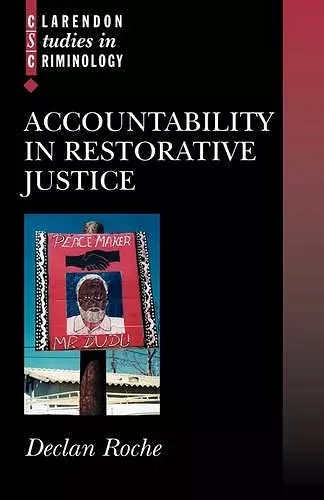Accountability in Restorative Justice
Understanding informal justice systems and their accountability mechanisms
Format:Hardback
Publisher:Oxford University Press
Published:27th Feb '03
Currently unavailable, and unfortunately no date known when it will be back
This hardback is available in another edition too:
- Paperback£34.99(9780199274277)

Exploring informal justice systems, Accountability in Restorative Justice examines the effectiveness and nature of accountability within restorative justice programs across various countries.
Many countries have implemented restorative justice programs, allowing those affected by crime to participate in meetings aimed at achieving reparation, reconciliation, and reintegration. Accountability in Restorative Justice delves into extensive fieldwork to analyze the nature and effectiveness of accountability within these informal justice systems. The book emphasizes the restorative justice movement's goal to shift away from the punitive mindset that dominates modern criminal justice, promoting ideals such as personalism, participation, and community reintegration.
Proponents of restorative justice argue that these principles create a more equitable and humane approach to justice compared to traditional court systems. However, Accountability in Restorative Justice also highlights the risks associated with unchecked participant power and the essential protective roles that state institutions and professionals play. The book underscores the necessity of procedural safeguards and institutional accountability to mitigate these risks while ensuring fair outcomes for all parties involved.
By examining 25 programs across six countries, the text reveals various forms of accountability, including informal deliberative accountability that emerges during interactions between victims, offenders, and their supporters. This deliberative accountability serves as a crucial mechanism for regulating decision-making and ensuring that agreements are upheld. Additionally, the book discusses the importance of formal accountability measures, such as external reviews, and proposes a new framework where judges take a more active role in overseeing restorative justice conferences, ensuring the quality of deliberation is prioritized over traditional sentencing norms.
... a major contribution to knowledge and debate about the prospects and problems of restorative justice. It is theoretically sophisticated and impeccably researched. It also has the merit of being a highly readable, empirically researched book. Roche never falls into the trap of overloading the reader with empirical observations and findings. The empirical material he does present is always put to good work, illustrating and supporting his claims and recommendations ... an outstanding study which advances significantly knowledge and the quality of debate about restorative justice. * Legal Studies 09/09/2004 *
This book should be read both by those who are, and who are not, advocates of restorative justice; it could open an important debate about the whole question of coercive, rather than persuasive, social control. * British Society of Criminology Newsletter *
This is a really good book. It draws from a wide range of international settings, without getting bogged down in unnecessary detail, it moves smoothly from complex theoretical frameworks of accountability to a persuasive grasp of the practical realities faced by restorative justice practitioners and it is written in an engaging and highly readable style ... Declan Roche has done restorative justice a considerable service. * Kieran McEvoy, British Journal of Criminology *
Roche's exploration of ... the relationship between accountability and the privacy of the participants, the integrity of the proceedings, the role of the media ... is as persuasive and nuanced as anything I have read on this issue. * Kieran McEvoy, British Journal of Criminology *
Compared to other texts on [Restorative Justice], this... is exceptional: it offers readers a concrete and dynamic view of [Restorative Justice's] promise and risks, a reflective and synthetic discussion of the importance of trust and accountability in criminal justice institutions, and an engagement with formal legality and state justice that goes well beyond words in boxes and bubbles from below. * Theoretical Criminology *
' ... Throughout the book Roche presents clear, very concrete and well-supported recommendations as to how the practice [of restorative justice] can be revised and developed to bring it in line with the ideal ... I regard Accountability in Restorative Justice as a major contribution to knowledge and debate about the prospects and problems of restorative justice. It is theoretically sophisticated and impeccably researched. It also has the merit of being a highly readable, empirically researched book' * Professor Gerry Johnstone, University of Hull, Legal Studies *
- Winner of Winner of the British Society of Criminology Book Prize 2003.
ISBN: 9780199259359
Dimensions: 225mm x 144mm x 23mm
Weight: 509g
336 pages